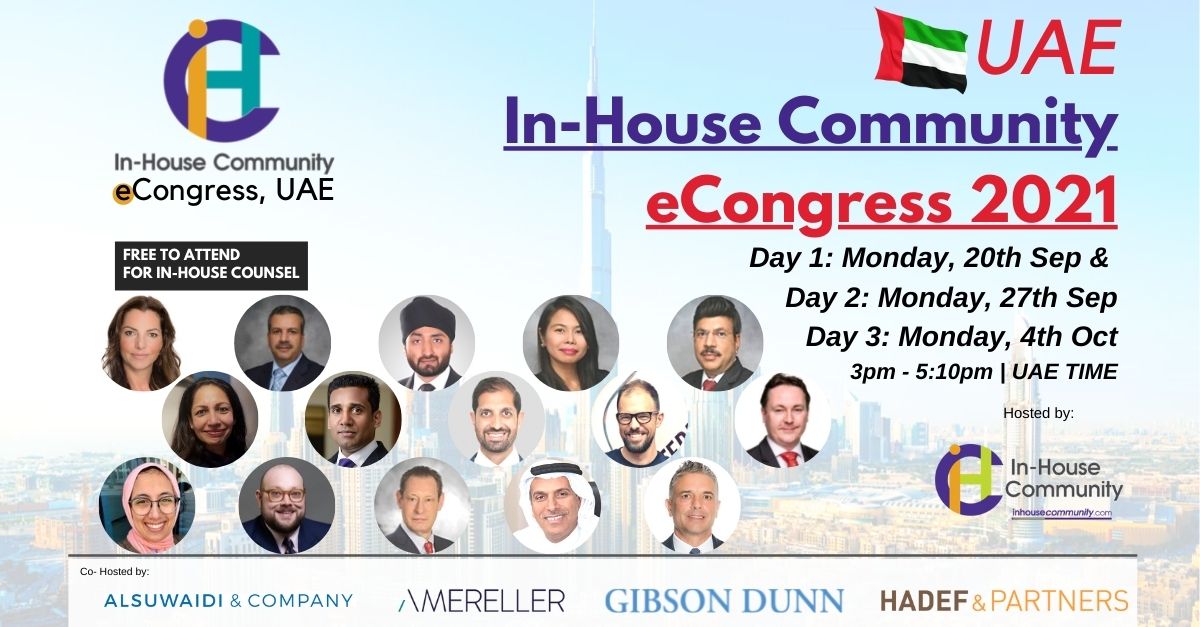December 24, 2021
Presentation by Gibson Dunn Dubai at the UAE In-House Community eCongress 2021: Navigating Financial Distress Including: Directors and management duties in the zone of insolvency Preparing for M&A process to divest assets Preparing for financial resources Managing emotional health throughout this process Presenting Firm: Gibson Dunn Dubai Speaker: Hardeep S. Plahe Aly Kassam The UAE In-House Community eCongress 2021 was attended by over 400/150 in-house counsel in UAE and the wider region. Hardeep S. Plahe and Aly Kassam from Gibson Dunn Dubai presented on Navigating Financial Distress and UAE Employment Law Update. You can watch the video of the presentation above or by clicking here. If you have any questions or would like to receive a copy of the presentation slides, please contact the presenters directly. Their contact information is below. Hardeep S. Plahe, Partner Mergers and Acquisitions, Capital Markets, Emerging Companies, Financial Institutions, Global Financial Regulatory, Investment Funds, Private Equity, Securities Regulation and Corporate Governance +971 (0)4 318 4611 hplahe@gibsondunn.com Aly Kassam, Partner Aly Kassam is a dual qualified partner (admitted in England and Wales and High Court of Hong Kong) based in the Dubai office of Gibson, Dunn & Crutcher. Gibson, Dunn & Crutcher LLP Building 5, Level 4, Dubai International Financial Centre, P.O. Box 506654, Dubai, United Arab Emirates... December 24, 2021
Presentation by Alsuwaidi & Company at the UAE In-House Community eCongress 2021: An overview of AML legislation and Dispute Resolution in the UAE today Co-hosts: Alsuwaidi & Company Speakers: Mohammed Alsuwaidi Suneer Kumar Reda Hegazy Robert Sliwinski Vida Grace The UAE In-House Community eCongress 2021 was attended by over 400/150 in-house counsel in UAE and the wider region. Mohammed Alsuwaidi, Suneer Kumar, Reda Hegazy, Robert Sliwinski and Vida Grace from Alsuwaidi & Company presented “What do you need to know? An overview of AML legislation and Dispute Resolution in the UAE today”. You can watch the video of the presentation above or by clicking here. If you have any questions or would like to receive a copy of the presentation slides, please contact the presenters directly. Their contact information is below. Mohammed R Alsuwaidi MANAGING PARTNER Dispute Resolution, Litigation and Arbitration 04 321 1000 Alsuwaidi@alsuwaidi.ae Suneer Kumar SENIOR ASSOCIATE Corporate & Commercial 04 321 1000 Suneer@alsuwaidi.ae Reda Hegazy SENIOR ASSOCIATE Dispute Resolution 04 321 1000 reda.hegazy@alsuwaidi.ae Robert Sliwinski OF COUNSEL Arbitration and Off-shore Dispute Resolution 04 321 1000 r.sliwinski@alsuwaidi.ae Vida Grace Serrano ASSOCIATE Corporate and Commercial, Employment and Real Estate 04 321 1000 Vida@alsuwaidi.ae Alsuwaidi & Company 252 Emarat Atrium Building, Sheikh Zayed Road, PO Box 7273, Dubai UAE... December 24, 2021
Panel discussion at the UAE In-House Community eCongress 2021: Diversity, Equality and Inclusion: Creating a diverse, equal and inclusive organization and the role of the In-House legal department. Plus, ‘Mental Well-Being beyond the pandemic’. Speakers: Andrew Cooke, General Counsel, Fnatic Deepa Tharmaraj, Senior legal director, Dell Technologies Faizal Latheef, Regional Legal Counsel, Middle East & Africa, AbbVie Yosr Hamza, Director, Legal Affairs, Middle East, Gartner Mohammed R Alsuwaidi, Managing Partner, Alsuwaidi & Company Sadiq Jafar, Managing Partner, Hadef & Partners The UAE In-House Community eCongress 2021 was attended by over 400/150 in-house counsel in UAE and the wider region. Andrew Cooke from Fnatic, Deepa Tharmaraj from Dell Technologies, Faizal Latheef from AbbVie, Yosr Hamza from Gartner, Mohammed R Alsuwaidi from Alsuwaidi & Company and Sadiq Jafar from Hadef & Partners presented on “Diversity, Equality and Inclusion: Creating a diverse, equal and inclusive organization and the role of the In-house legal department. Plus, ‘Mental Well-Being beyond the pandemic’”. You can watch the video of the presentation above or by clicking here. If you have any questions or would like to receive a copy of the presentation slides, please contact the presenters directly. Their contact information is below. Andrew Cooke General Counsel, Fnatic Deepa Tharmaraj Senior legal director, Dell Technologies Faizal Latheef Regional Legal Counsel, Middle East & Africa, AbbVie Yosr Hamza Director, Legal Affairs, Middle East, Gartner Mohammed R Alsuwaidi Managing Partner, Alsuwaidi & Company Sadiq Jafar Managing Partner, Hadef &... December 24, 2021
Presentation by Hadef & Partners at the UAE In-House Community eCongress 2021: Commercializing your intellectual property rights in UAE Including: Key content in agreements commercializing intellectual property Intellectual property audits Effective protection strategies in a global marketplace Checklists for in-house legal departments Presenting Firm: Hadef & Partners Speakers: Victoria Woods, Partner, Head of Commercial James Dunne, Head of Trade Marks and Brand Protection The UAE In-House Community eCongress 2021 was attended by over 400/150 in-house counsel in UAE and the wider region. Victoria Woods and James Dunne from Hadef & Partners presented on “Commercializing your intellectual property rights in UAE”. You can watch the video of the presentation above or by clicking here. If you have any questions or would like to receive a copy of the presentation slides, please contact the presenters directly. Their contact information is below. Victoria Woods Partner, Head of Commercial Commercial, Data Protection, Information and Communications Technology (ICT), Intellectual Property, Technology, Media & Telecommunications (TMT) +971 4 429 2999 v.woods@hadefpartners.com James Dunne Head of Trade Marks and Brand Protection Commercial, Intellectual Property +971 4 429 2999 j.dunne@hadefpartners.com Hadef & Partners LLC 12th Floor, The Blue Tower, Sheikh Khalifa Street, P.O. Box 3727, Abu Dhabi, UAE... December 15, 2021
By virtue of Republic Act No. 7916, the Philippine Economic Zone Authority (PEZA) was created to establish various economic zones and attract legitimate foreign investments into the country. The PEZA administers certain incentives to local enterprises that operate within these economic zones and helps facilitate their respective business operations. In line with these policies, the PEZA exercises the authority to issue work visas to their foreign personnel, particularly those who hold executive positions (i.e. Presidents, Vice-Presidents, Treasurers, General Managers, or their equivalents), or whose employment is supervisory, technical, or advisory in nature. On 11 November 2021, the PEZA and the Bureau of Immigration (BI) entered into a Memorandum of Agreement (MOA) to provide efficient and harmonized rules on the issuance of work visas to qualified foreign nationals and their dependents. Previously, these foreign nationals were qualified to secure 47(a)(2)(PEZA) visas under the authority of the Department of Justice (DOJ). Under the new rules, however, these foreign nationals shall now secure PEZA Visas (PV) from the PEZA and BI. Among the notable changes introduced in the MOA is the longer validity of the PV. The PV is valid for a maximum period of two (2) years, and is coterminous with the period stated in the foreign national’s employment contract. The application shall also come with a notarized certification which confirms that the Company’s total number of foreign personnel does not exceed five percent (5%) of its total workforce. Marriage and birth certificates of the PV applicant’s dependents are now required to be authenticated/apostilled, if issued abroad. Notably, English-translated certificates were previously accepted by the PEZA even if they were unauthenticated.... December 15, 2021
“Environmental, Social, and Governance,” or “ESG” has increasingly become a topic of discussion. The driving force for the fast-paced development of ESG stems from the 2030 Agenda for Global Sustainable Development Goals (SDGs), adopted by all United Nations Member States in 2015, and the Paris Agreement. The Paris Agreement, which came into force in 2016, has been joined by 191 Parties and creates commitments from all countries, including developing nations such as Thailand, to reach their greenhouse gas emissions reduction targets. Thailand launched a five-year National Economic and Social Development Plan to adhere to the 20-year National Strategy Framework (2017-2036), meet SDG targets, the Thailand 4.0 Policy, and other reforms. While the momentum for ESG started in the governmental sector, all stakeholders (including the private sector, financial institutions, and investors) are key players in driving and maintaining sustainable practices. Lessons from the Covid-19 pandemic are also an accelerator for companies to shift their focus to become more resilient to crises. By emphasizing responses to social and environmental factors rather than traditional corporate operational outlooks, visionary companies are developing a compass to be better equipped to respond to future crises and steer through volatility. What does ESG entail? ESG encompasses a broad range of issues, for example: Environmental: climate change, pollution, deforestation, energy efficiency, waste management, and natural resources utilization Social: human rights, labor standards, community relations, gender and diversity, data protection and privacy, health, and safety measures Governance: corporate governance, compliance, bribery and corruption measures, executive compensation, taxation approaches, lobbying, political contributions, and whistleblower schemes. In brief, environmental criteria are used to evaluate a company’s performance as a steward... Upcoming Events
Recent Past Events













